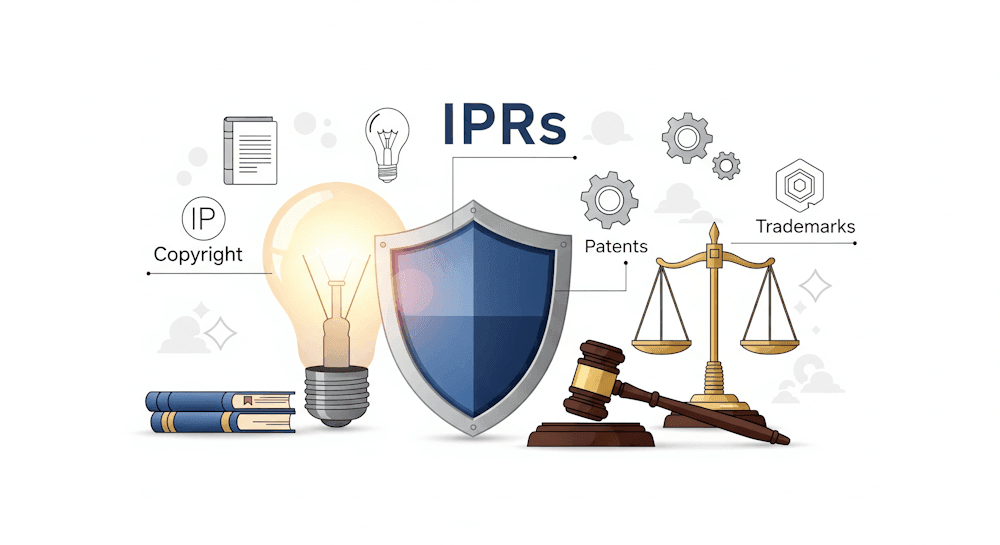So here's the thing. When someone says “intellectual property rights,” most people immediately zone out or assume it's legal talk meant for corporate lawyers. But actually, it’s something that affects almost everyone—especially if you’re someone who creates stuff.
You don’t need to be a tech inventor or own a company to care about IPR. Ever posted an original photo online? Wrote your own blog? Came up with a cool product idea and told your friend not to share it? Yeah. That’s you, brushing up against intellectual property.
Let’s take a minute and break down what IPRs actually are like, in plain, no-fluff words. No legal dictionary required.
1. First Off, It’s Not Physical. You Can’t Hold It.
So intellectual property is about ideas. Creations of the mind. Stuff like music you wrote, a logo you designed, a new tool you invented, or even a story plot. It’s all about what you created, not something you can touch.
You can print a book or launch an app, sure. But what the law protects is the thought behind it—the original concept. Weird, but kinda cool.
2. You Get Rights—but Not Just to Flex
The law gives you certain rights over your creation. That includes saying who can use it and how.
You can sell it, license it, or keep it to yourself. But here’s the thing—once you’ve got those rights, you also have to respect others’ rights. You can’t just copy someone’s logo because you “like the style.” That’s not how it works.
3. It’s All Legal—Written Into Real Laws
This isn’t some informal “I made this so it’s mine” deal. Intellectual property is backed by laws. In India, we’ve got The Copyright Act, The Patents Act, Trademark rules, and more. Everything’s written out.
So if someone messes with your IP, you can actually sue. It’s not just a warning—you’ve got real legal ground to stand on.
4. It’s Regional (and That Trips People Up)
This one’s important: your rights don’t automatically work everywhere. They’re usually only good in the country where they’re registered.
Got a patent in India? That doesn’t mean it’s protected in the U.S. unless you register it there too. It’s all territorial.
5. You Can Sell It, Just Like You Sell Stuff
This might surprise you, but IP is property. Just like a car or apartment. You can:
- Sell it outright
- Rent it out (aka license it)
- Let others use it in exchange for money
Musicians do this all the time with their songs. Developers license their software. Artists let brands use their designs. It’s a whole economy.
6. It Keeps Changing (Which Makes Sense)
Technology evolves, and so does intellectual property law. Copyright now applies to software, websites, and even memes in some cases. Patents aren’t just for machines anymore—they’re for things like medical techniques, biotech, and more.
So yeah, IP law is always playing catch-up with real life. And that’s kind of the point—it changes as people create new things.
7. What You’re Protecting Decides the Type of IP
There’s no one-size-fits-all IPR. Depending on what you created, the law gives different types of protection:
- Made a song? → Copyright
- Built a new device? → Patent
- Came up with a unique brand name or logo? → Trademark
- Grew something special in your region? → Geographical Indication
- Developed a secret formula? → Trade secret
Each has different rules and lifespans. You gotta figure out what fits your work best.
8. You Can Layer Rights on the Same Thing
This part’s kind of wild. Let’s say you’re building a new gadget.
- The look of the device? → Design right
- The technology behind it? → Patent
- The logo on it? → Trademark
- The instruction manual? → Copyright
All of these can exist on one product. That’s how companies protect their stuff from every angle.
9. You Don’t Control the Product Forever (Yep, That’s a Thing)
So here’s the deal: once you sell something, you usually can’t stop people from re-selling it. That’s called exhaustion of rights.
If you legally sell your book to someone, they can sell it to someone else. You can’t chase them down and say “Hey! That’s my book!” Nah—it’s theirs now.
The law says your right stops after the first authorized sale. Makes sense, right?
Why It Matters (Even If You’re Not a Big Brand)
IP isn’t just about protecting billion-dollar companies. It’s about making sure your ideas don’t get stolen, and that you get credit (and maybe even money) for what you create.
Whether it’s a blog post, a drawing, or a small side business, knowing your IP rights gives you leverage. It’s power. And yeah, it can protect your hustle.
Quick Recap? Here’s the Gist:
- IP rights protect ideas, not just physical stuff
- You can register, sell, or license them like any other asset
- They’re based on country laws—regional, not global
- IP keeps growing as creativity grows
- Your one creation can have multiple layers of protection
Want more like this?
- Check out Blog 8: What Makes Geographical Indications So Special?
- Or Blog 7: Trade Secrets vs Copyright – Big Differences Explained
- Back to Start: The Basics of Intellectual Property Explained Simply



